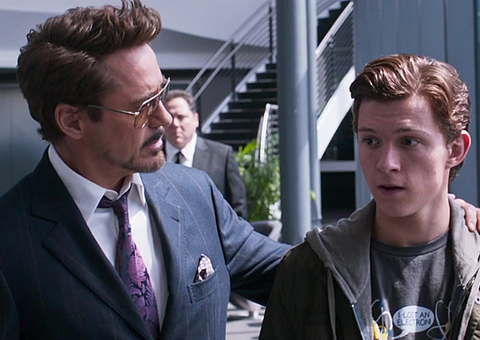
Oct 18, 2019 | Columns
Alex Kaplan (V)
WARNING: This article contains spoilers for Avengers: Endgame and Spider-Man: Far From Home. If you don’t want to read spoilers, don’t read on.
This past July, I saw the release of the second Spider-Man film from the Marvel Cinematic Universe––Spider-Man: Far From Home. The film was a continuation of where the universe left off after Avengers: Endgame. The world is clearly still reeling from the loss of Iron Man in the battle against Thanos at the Avengers Headquarters, and the people are looking for a new symbol of peace. Nobody feels this pressure more than Peter Parker (played by Tom Holland), Tony Stark’s protege and high-school spider-teenager. He is hounded by the press and Nick Fury, and to top it all off, Stark left Peter unfettered access to his military-grade weapons system, EDITH (“Even Dead I’m The Hero”). The story follows Parker as he deals with this pressure and interacts with Mysterio, a walking fake-news metaphor. The circumstances around the film raise a lot of interesting moral questions, including whether or not it is acceptable to deceive people for their own comfort, and if it is fair to interrupt a hero’s daily life to recruit them for a mission. Chief among these questions is this: is it fair to lay the hopes of the world on a teenage hero?
Throughout the film, Peter Parker struggles to balance his life as a normal teenager with his superhero persona, which leads to some perilous situations. Peter spends the majority of the film on a field trip across Europe, where he tries to ask out his crush, MJ. While on a bus through the countryside, Peter realizes that the glasses Tony Stark left for him house EDITH, and he attempts to use it to remove an embarrassing photo from another student’s phone. Instead, he fails to exercise proper precaution and nearly kills a member of his class with a drone strike. Needless to say, Peter does not have the proper experience necessary to operate military-grade artificial intelligence technology. He is too concerned with the issues surrounding his high-school life to to focus on properly utilizing weapons technology.
Unfortunately for Peter, he has to focus on being a hero, or wherever the trip goes, massive elemental monsters follow. This seems to take a toll on him, as throughout the film Peter laments not being able to spend time with the people in his class. Speaking directly to Mysterio, he says, “I didn’t think I was going to have to save the world this summer. I know that makes me sound like such a jerk. I just, I had this plan with this girl that I really like, and now it’s all ruined.” Peter is unable to commit his time to heroism, and, in my opinion, the Avengers should not expect him to. He deserves to have a high school experience like anyone else’s.
Overall, I thought that Spider-Man: Far From Home was a well put-together and enjoyable film. I encourage anyone who likes both high school dramas and superhero/military shenanigans to watch it. It also serves as an effective reminder, and a cautionary tale to people like Pingry students, that teenagers should not be trusted with the fate of the entire world. Much like Peter Parker, we must be wary of overextending ourselves.
Spider-Man: Far From Home: 8.5/10
Tony Stark’s Moral Choices and Placement of Responsibility: 3/10
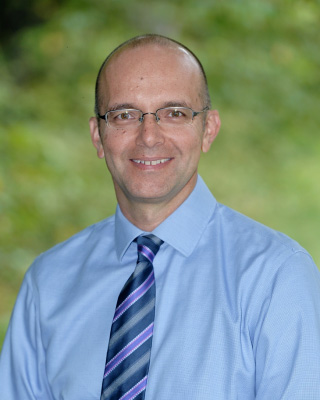
Oct 18, 2019 | Faculty + Staff
Josie Alston (V)
This fall, Pingry welcomed Mr. Kevin Schroedter to the Middle and Upper School Language Departments. Mr. Schroedter teaches French 2 in the Middle and Upper School, along with Spanish 2 and French 5 in the Upper School. He is the assistant coach for the high school water polo and swim teams.
Born in Bogota, Colombia, Mr. Schroedter grew up immersed in the Spanish language and continued to speak it throughout his childhood after he relocated to Miami. However, Mr. Schroedter fell in love with French, a language held in high esteem by his family, especially his grandfather, who served as a French professor for the Colombian military and as a military attaché in Paris.
Mr. Schroedter continued to pursue his passion at Duke University where he earned his B.A. in Political Science and French, and Middlebury College where he earned his M.A. in French.
Mr. Schroedter is no stranger to teaching, as this year marks his 28th year teaching French and Spanish at a day or boarding school. He has taught at a “long list” of schools all over the world, including London, Paris, Zermatt, California, Delaware, Texas, and North Carolina. He describes teaching as a way to “stay immersed in the French world and earn a living” while using professional development opportunities to “become a better teacher” and “connect with young people to make a difference.”
Although it has only been a few months, Mr. Schroedter really enjoys Pingry, describing it as a “convivial environment” where he can enjoy the support of his colleagues and get to know his students better. He acknowledges that Pingry can be a “high-pressure environment” at times; however, the school exudes an air of “humanity,” with enough “down moments in the day to form human connections, which makes it motivating and both physically and emotionally possible to invest so much in the academic part of things.”
Mr. Schroedter has experience working at similar schools and has set “finding [his] way, getting used to how things are done, adapting to expectations, and transitioning to the department” as his goals for his first year.
In his free time, Mr. Schroedter likes to stay active and exercise with his wife and Carolina dog/Australian cattle dog mix, Tasha. He spends a lot of time on a bike as a way to “decompress”, and he enjoys going on walks in the park and on the beach with his family. A self-proclaimed foodie, Mr. Schroedter loves finding new places to eat, citing “sitting down with a book and cappuccino and watching the world go by” as one of his favorite things to do.
Mr. Schroedter is looking forward to his first year at Pingry and he is ready to weather the challenges that come with being a new teacher.
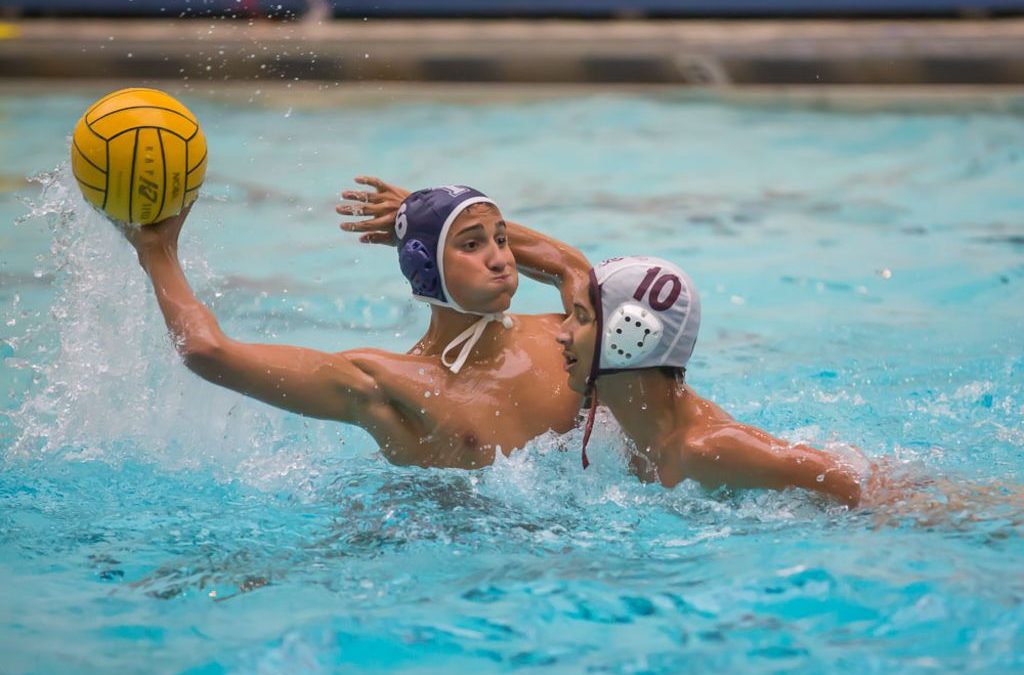
Oct 18, 2019 | Athletics
Justin Li (V)
The day preseason began, Head Coach Aleksandar Breznikar stepped down from his position. The team received this news only one year after losing its previous Head Coach, Misha Klochkov, to the Lawrenceville School.
In spite of these obstacles, the water polo team, now co-coached by Jeffrey Jenkins, Steve Droste, and Kevin Schroedter, has maintained a 5-2 record and, more importantly, has shown tremendous resilience. The captains, goalies Mason Stahl (VI) and Dilan Bhat (VI), have stepped up to play key roles in leading practices and facilitating gameplay. Returning players have cultivated their skills to fill the gaps that have formed with the departure of last year’s seniors. The team has also gained a group of promising freshmen.
The Big Blue team competed in the Beast of the East tournament in late September, where it faced more established water polo tournaments in the region. Though the players did not meet their goal of winning their division, sharpshooter Noah Bergam (V) saw a net positive from the team’s participation: “Playing against teams we’d never competed against forced us to adapt our strategy to unfamiliar game styles. We were able to learn a lot from the more experienced teams at the tournament.” So far, the water polo season has forced the team to adapt in the face of unforeseeable difficulties. Regardless, they hope to challenge their rival, The Lawrenceville School, for the state championship and secure a place in the Easterns Prep tournament at the end of the season.

Oct 18, 2019 | Athletics
Brian Li (VI)
The boys’ cross country team is hoping to repeat their successes from last year. Despite losing four seniors, two of whom were exceptional runners, captains Roger Matthews (VI) and Henry Wood (V), along with Coaches Matt Horesta and Tim Lear are leading a team ready to embrace new responsibilities.
With eight new freshmen joining the team this year, Coach Horesta remarked that the team has “a younger feel” to it. “They’ve been a great addition to the team,” Horesta said, in regards to its future.
When asked about the season so far, Coach Horesta said that the team has already improved but is “only halfway to where we need to be to compete at our best in late October through the middle of November. We’ve just been getting ready more than anything else so far.”
After the season’s first meet against Bernards on September 12th, which Coach Horesta described as a “starting point which gave us a sense of where we were at and how much we need to do to keep going,” the team ran its second meet in Morristown with “important improvement.”
The team, aiming to win the Prep “A” Championship for the fourth consecutive time, will have its work cut out against Lawrenceville and Oratory Prep. The team also hopes to match last year’s achievements, including placing third in Somerset County and reaching the top five teams of the Skyland Conference.

Oct 18, 2019 | Athletics
Brooke Pan (V)
The girls’ cross country team is looking forward to a promising season. Led by captains Nicole Vanasse (VI) and Alina Irvine (V), the team is off to a great start with the varsity team placing third overall in the Ocean State Invitational.
The team’s main goal for this season is to qualify for the Meet of Champions—a highly competitive meet which admits only the top two teams from each division.
To achieve this goal, Coach Grant’s priority is for the team to stay healthy.
“If everybody’s healthy at the end of the season, I think we’ve got a very good opportunity to win,” he said.
Reflecting on last year’s season, Coach Grant is thrilled by the addition of five new freshmen, a refreshing increase from last year. With a bigger team, Coach Grant is excited for the possibilities that new freshmen will present for the team.
Irvine (V) expanded on this idea, emphasizing the role of individual and team improvement: “It is the most rewarding thing for a runner to see that all of their hardwork and dedication paid off when they run a personal record.”
Irvine hopes that “consistent, hard-effort training,” while still “giving each girl a chance to recover,” will enable each runner to achieve her goals.
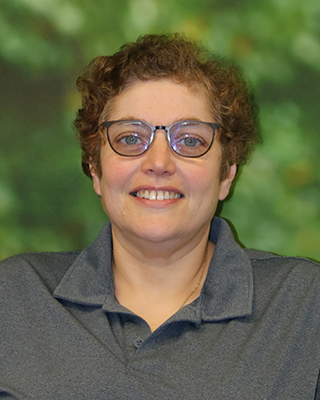
Oct 18, 2019 | Faculty + Staff
Rhea Kapur (V)
Ms. Alexandra Lasevich joins Pingry this fall as the new Math Department Chair. She also teaches Advanced Algebra and Trigonometry, both regular and honors, as well as Precalculus.
After earning a B.A. in Mathematics from the University of Rochester, Ms. Lasevich went on to receive an M.S. in Educational Leadership at Delaware Valley University. She is currently working on her dissertation for an EdD from Delaware Valley University and aims to defend it this summer. Her research focuses on international faculty teaching in independent schools and examines how they are adjusting to teaching in schools they never attended. Ms. Lasevich herself was born and raised in Russia, and she notes how interesting it has been for her to come to America and experience a different style of education.
Prior to coming to Pingry, Ms. Lasevich taught math at Princeton Day School and was a part of the Community and Multicultural Development Team. She also led a number of student organizations: two affinity groups (the LGBTQ affinity group and the Jewish affinity group), GLOW (similar to Pingry’s GSA), SAFE (a diversity group), and a Russian Club.
When asked to detail her path to teaching, Ms. Lasevich said “When I came to this country, I was studying to be a computer engineer. And when I arrived at my first school, I didn’t speak English. They realized very quickly that my math was more advanced than that of the average American student, so they asked me to tutor.”
“At first, I looked at it more as a source of income, but people were coming in, and all of a sudden there were lines and lines of people,” she said. “They kept saying, “You should teach, you should teach, you’re good at it!” So I switched to pure mathematics––I hadn’t yet decided to teach, though––and pursued theoretical mathematics for some time, until the end of my senior year, when I decided to get my certification.”
In addition to teaching mathematics, Ms. Lasevich also advises Middle School Homework Club and plans to help out the Russian Literature Humanities Independent Research Team with understanding the meanings and cultural context behind the various Russian names.
“I want to not get lost this year. It’s confusing, but I think I’m OK now with the corridors,” Ms. Lasevich joked. But, in all seriousness, she hopes to get to know the school, the school culture, and the Math Department better, and just observe and learn.
“I love it here,” she said. “I think it is an amazing place to work. And from what I see, it seems to be an amazing place to be a student.”
Ms. Lasevich spends quite a bit of her free time working on her dissertation. But she also loves to garden; it’s one of her favorite things to do. Currently, she’s experimenting with new plants, growing from seeds and learning how to care for her newly fruiting fruit trees.
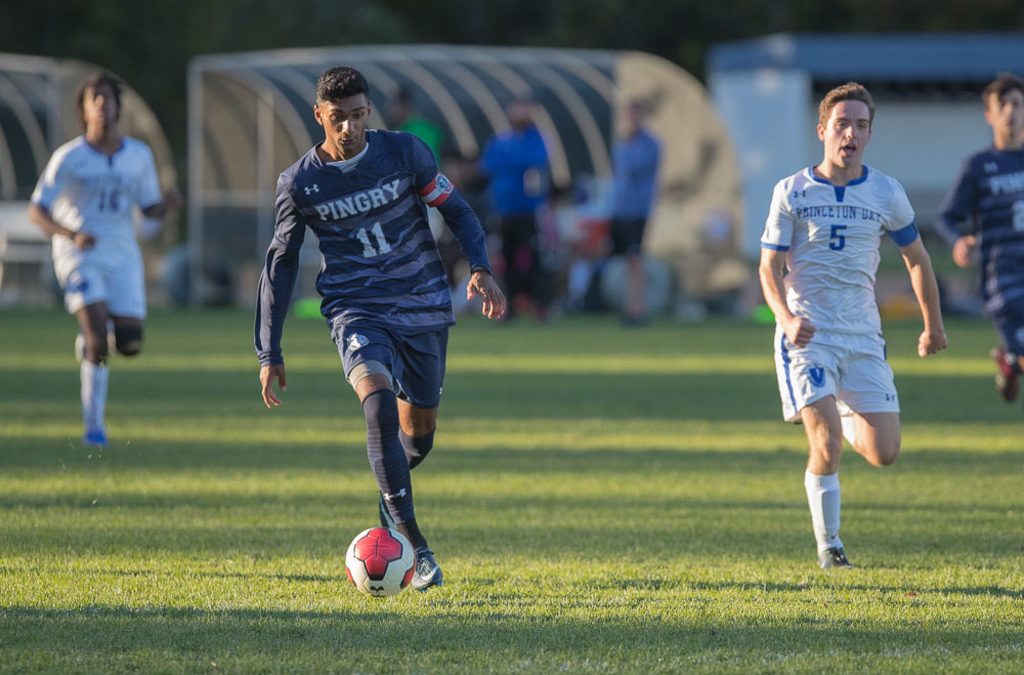
Oct 18, 2019 | Athletics
Matthew Lee (VI)
The boys’ soccer team started the first month of their season strong. Ranked as the third-best team in the state, their expectations are sky-high. With goals to win Somerset County and Non-Public “A” state titles, the team’s mentality this year has been “championship or bust” since the first day of preseason.
“The Pingry soccer program has the goal of winning County’s and State’s every year,” captain John Robertson (VI) said.
Although these are high standards, he knows that “if we can go five or six games in a row without conceding a goal, and the offense can do its job, the wins will come.”
Pingry currently has a 9-2 record and looks to build upon the success they’ve had so far. Unlike last year, the team has been finding ways to win close games. Two weeks ago, they won a two-overtime thriller against a top-twenty Hunterdon Central team. During Homecoming, they defeated Princeton Day School 6-0. Robertson attributes their success to “the depth we have at many different positions.”
Heading into the home stretch of the season, the team will lean on its senior leadership.
“The soccer team has a huge group of seniors with a lot of talent who lead by their play on the field,” Robertson said. “Four captains are super helpful because we can pick each other up, and there are also multiple seniors on the bench who have amazing energy and who support the team in any circumstances.”
The boys look to continue their great season against Gill St. Bernard next week and into the county tournament.
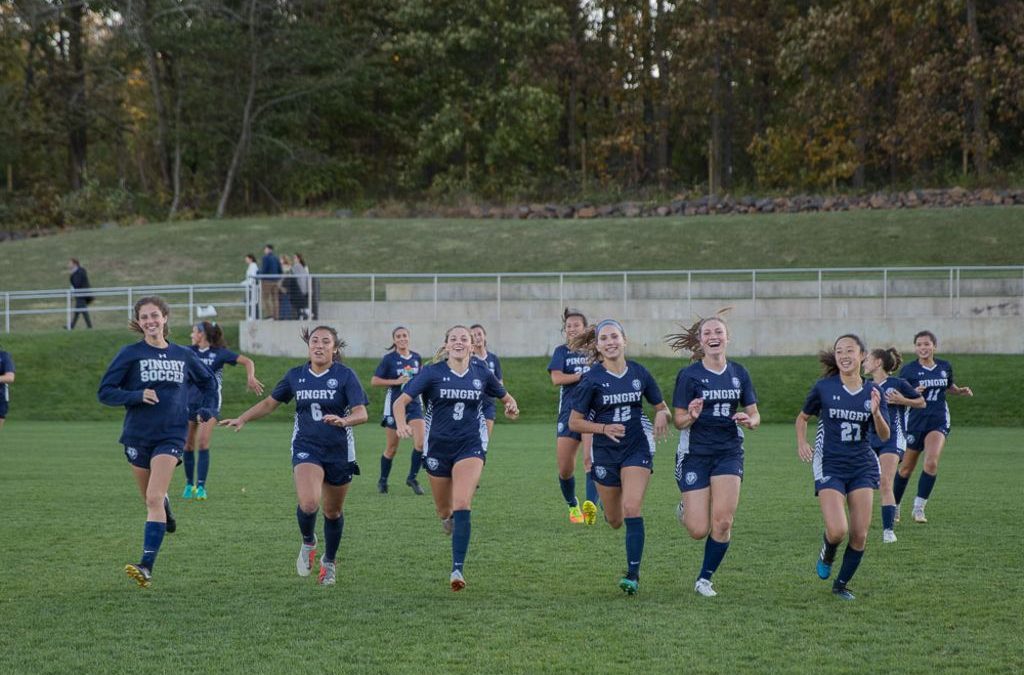
Oct 18, 2019 | Athletics
Dean Koenig (V)
The girls’ varsity soccer team has had a successful season thus far, winning nine of the team’s first twelve games. The team, led by captains Emma Capanna (VI), Sofia Lombardo (VI), and Leah Mangold (VI), has been dominant in their wins; the goal differential for all nine wins has been greater than one, while only one of the team’s losses has been decided by more than one goal. The offense has managed to score forty-six goals so far, achieving an average of almost four goals per game. This powerful offense is complemented by an unwavering defense that has allowed only twelve total goals this season.
Head Coach Lauren Molinaro says, “We are in control of our own destiny… if we focus and put in the work, we will see results.” The players have a reputation to uphold their great work this season, as they won the sectional title last year. With great confidence in her team, Olivia Volpe (V) says, “We are beginning to hit our stride and we all know this year is going to be special.”
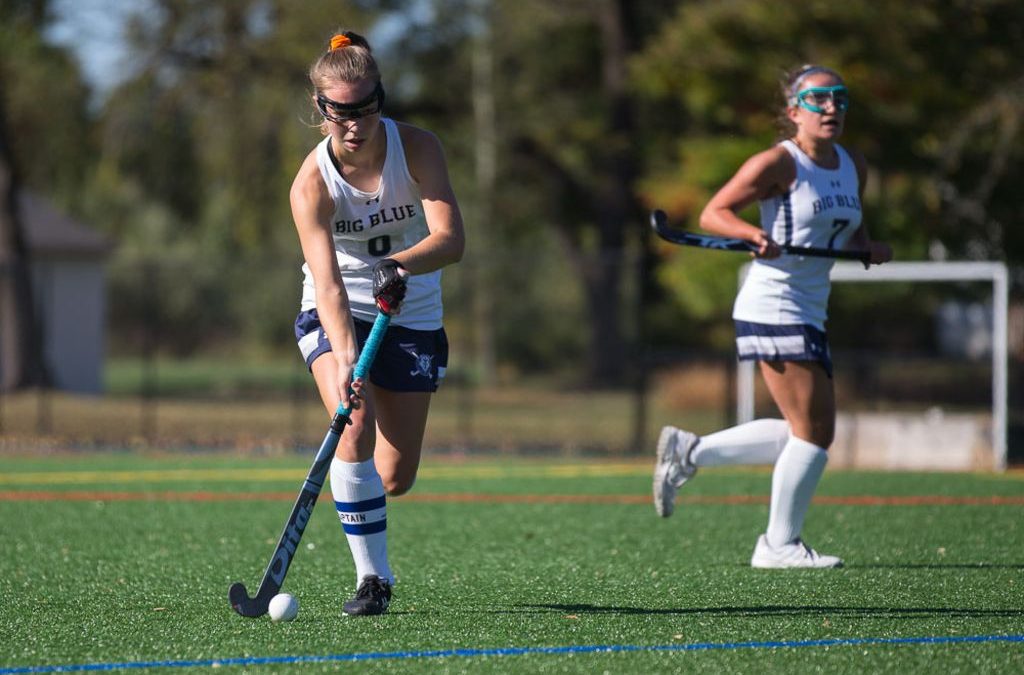
Oct 18, 2019 | Athletics
Carolyn Coyne (V)
Big Blue field hockey is off to a strong start this year, with senior captains Hannah Dillon (VI), Liv Nugent (VI), and Caroline Dannenbaum (VI) leading the team to unprecedented victories in a difficult division. Dillon believes that the team is “looking really strong going into tournament season,” especially in terms of passing. Nugent agrees, claiming that the “team culture is better than ever.” Senior player Lizzie Gilfillan (VI) adds that being this “tight-knit family off the field translates onto the field with our passing connection.”
This strength in passing has been developed by the new varsity head coach, Mr. Izaak Pels. Coach Pels believes that the team is receptive to the ideas and culture he is instilling. He says that the team’s “ability to adapt and change culture has been a remarkable aspect of our versatility.” He thinks that what has happened this year will change team culture for years to come. Head JV coach Margi Dillon agrees, believing that the huge group of dedicated freshmen on JV will help build the program. Indeed, as Coach Decatur says, the future is bright for Pingry field hockey.
Sep 17, 2019 | Noah Bergam, Uncategorized
By Noah Bergam ’21
A few times in the past month I’ve brought up in casual conversation that CLIMATE CHANGE IS THE BIGGEST ISSUE FACING AMERICA, outweighing all other problems except maybe healthcare.
I admit, it’s an annoying way to hijack a perfectly good lunch hour: “Way to make me feel bad about this hamburger, Noah!”
I also will contend that it’s a bad habit to publicly blurt out political opinions for no real reason. I try not to, but when it happens, it happens, and it’s usually a respectful experience I can walk away from with new insights.
Specifically, I’ve come to realize that my thoughts about how to address climate change––that we need heavy carbon taxes, unrestricted economic overhaul, and short term economic fallout––are not necessarily right, that my all-caps thoughts aren’t necessary, trump card, scientific fact; they’re opinions, and I tend to lose sight of that.
I think a lot of us do. In a way, it’s selfish to go out and assert that this issue is number one because we understand science, that we need to merge all of our priorities down this road, no questions asked. I’m aware of my privilege––I live in a community that has wealth enough to support cleaner industries and not live off manufacturing jobs.
I still believe climate change is the number one issue facing America. But I’ve begun to realize that treating it as such is not the best solution.
I don’t think that’s hypocritical. My vision for a perfect world doesn’t have to line up with my policy plan for an imperfect world. For example, I might believe abortion is an immoral action, but from a policy standpoint I would be pro-choice, because banning abortion would be a public health disaster; there would just be an illegal abortion system that would end up hurting more than helping.
Similarly, while I may think climate change deserves an immediate Green New Deal, I understand the huge ramifications of pushing an unwilling nation into such a project.
Of course, it’s quite necessary that we have to make America and the rest of the world come to terms with the facts of climate change. Our nation especially needs to stop treating it as a partisan issue. The battle for activism and awareness is crucial no matter what course of action we take.
But until that battle is won, a real Green New Deal is not an economically viable solution.
The only way out is investing in technology and making legitimate progress in geoengineering, carbon capture and storage, environmental engineering of all kinds, and of course, renewable sources. We must optimize solar and wind, clean up and consolidate nuclear energy––in all cases, positively incentivize the shift away from fossil fuels. Until fighting climate change becomes profitable, it will be virtually impossible to enact change to the fossil-fuel-industrial-complex without incredible pushback.
What is not going to fix climate change is words alone.
If history has taught us anything, it’s that technology effects change much faster than words. The Industrial Revolution was easily the most effective and indelible revolution in history. While most human-led rebellions ended up putting power back into the hands of the wealthy and powerful, the Industrial Revolution and the eddies of it that still spin around the world today have actually increased the average standard of living in practically every regard, what with vaccines, birth control, and boosted agricultural productivity.
Of course, history provides us with rife examples of revolutions that have succeeded in their goal, that have successfully changed the status quo in regard to equality under law or self-determination.
But climate change doesn’t stem from prejudice or independence per se, although it is definitely tied to those concepts. To fix climate change, making the average person acknowledge its threat and act accordingly is just the first step: a necessary words-based revolution that we must fight, but a first step nonetheless.
Many activists, and even candidates for president, are chasing a second step that is still a words-based revolution––and that is where we see the issues. This second step, in their eyes, is to regulate industry on an unprecedented level, to force the US economy, and hopefully that of the world as well, to discard short term profits for the long term betterment of the earth. Some spin on the concept of a Green New Deal.
The issue is visible in the phrase itself. Roosevelt’s New Deal was catalyzed by dire circumstances, not scientific consensus of a future issue. Global warming is a slow burn, nothing like the sharp crash of the 1929 world economy. World destruction is foreseeable, but is not something the government wants to necessarily take the jump and address at the moment, while the economy is still going well. Governments and economies have a tendency to act ad hoc, or worse, push the issue to the future, rather than foresee issues and act accordingly. The US government, designed with a conveniently short four-year executive term, has done so with a whole host of issues, ranging from slavery to civil rights to Vietnam.
Why should we have reason to believe that today is any different?
If we do find a solution to climate change before climate change causes massive disaster, we have to find the solution. No matter how much Greta Thunberg and Extinction Rebellion chastise the world’s officials, we can’t rely on such officials to design unrealistic compromises with what little green options they have. They need more to work with. They need something marketable.
That marketable solution, of course, will take government funds in the form of research grants and subsidies; it will take serious, dedicated scientific work. We need to develop the technology that can challenge fossil fuels on a global scale. Because, yes, even if America or Britain or Sweden can forcefully, governmentally realize a green economy, there is certainly no guarantee that developing nations who have yet to reap the full benefits of fossil fuels will follow suit and give up all their potential gains.
When thinking in crisis mode, it is easy to lose sight of just how hard it is to get the rest of the world on the same page as you. The world is abundant with problems. The lunch hour is rife with opinions.
And that lunch hour ends. The world churns on. The Arctic melts. Words certainly matter, but they work slower than we think.
Mar 24, 2019 | Brynn Weisholtz, Editorial, Opinion
By Brynn Weisholtz ’20
Standing in line to see Come From Away at the Schoenfeld Theater in New York City, I found myself wishing I were on a different line waiting for basically any other show. I peered around at the other shows near me. I saw Dear Evan Hansen and sighed; Kinky Boots and smiled; Hamilton and gasped. Indeed, I knew nothing about Come From Away except that my mother had met an older woman at Dear Evan Hansen who raved about it and convinced her to catapult Come From Away to the top of our Broadway wish list.
As the doors opened at 7:30, the line filed into the smallest theater I had ever been in. My family took our seats and, as I looked around, I noticed that the average age of the audience was somewhere between the ages of my parents and my grandparents. Suddenly, I heard a woman explaining that she and her husband had flown into New York City from Newfoundland this very morning to see the play. As the lights began to dim, my curiosity was piqued by her story; she had, in fact, lived through some of the events that were to be featured in the musical.
I knew Come From Away centered around the small town of Gander in Newfoundland, Canada, where an intimate community rallied to help strangers following the terrorist attacks of September 11, 2001. However, I did not have any concept of how the tragic events of the day forever changed the lives of the selfless people of Gander. With air traffic halted and planes unable to land in the United States, 38 planes were diverted to Gander Airport, and Gander, with a population of only 9,000, welcomed over 7,000 strangers from across the world with open arms. At a moment’s notice, cots were set up in schools, supplies were retrieved from local stores, food was prepared, and no questions were asked except, “What else can I do?”
I was truly in awe of all the people who opened their hearts and homes to complete strangers. The residents of Gander welcomed citizens from all walks of life and were not deterred by language or cultural barriers; instead, they bonded, embraced one another, celebrated life, and mourned the world’s tragedy alongside strangers, some of whom would become lifelong friends.Throughout the 100-minute musical, I was entranced by the story depicted on stage, one that brought both laughter and tears to my fellow onlookers and myself. While the majority of the audience appeared to vividly remember the events of 9/11, I only know of that day through second hand stories, as I was not yet born. Growing up in a post-9/11 world, I cannot fully comprehend how different life used to be, but the musical brought me to a better understanding of how radically the world around me has changed. Although I was not alive that fateful September morning, the tears I shed at the performance of Come From Away connected me with the people in that theater just as the people of Gander connected with their visitors. The show I regretted leaving my house for opened my eyes to see how selfless humans can truly be.
Mar 24, 2019 | Editorial, Opinion
By Ethan Malzberg ’19
I grew up with a life-size band-aid covering wounds it never healed.
Though the expanse of years has erased much from my memory, I’ve never forgotten any of the comments on my gay voice. The first was in fifth grade. I beat him in a game of War, to which he responded, “At least I don’t have a gay voice!” It was a word still foreign to me, only heard on commercials for Modern Family, but it has altered the way I view myself even to this day. In a term I learned from Dr. Rodney Glasgow at the Student Diversity Leadership Conference, it was cognitive dissonance — an “identity bump” — with one comment completely changing my own perception of my identity in a way I had never considered before.
I ran home to my mom that day, impatient to tell her what that boy said. After a brief pause, she delivered the normal parental recourse for when your kid is bullied: “You’re not gay, he’s just trying to insult you because he’s jealous. Don’t let him bring you down!” It was a relief to hear this from my mother at the time: I was not the unfamiliar word with which he described my voice because my mom said so. It was a little band-aid to shield an enormous insecurity that has stalked me since.
It was also a relief to hear my guidance counselor repeat the same sentiment the following day. “You’re not gay, he’s just trying to insult you because he’s jealous. Don’t let him bring you down!” It was the perfect recipe for repression; I could now ignore his comment for the foreseeable future because my mom and guidance counselor said so. That is, of course, until the next “your voice is gay” would come just two months later at camp. Although the band-aid’s effect was fleeting, it was just what I needed at the time.
Years later, I discovered an email chain between my mother and my guidance counselor about the incident. “[Redacted] called Ethan’s voice ‘gay’ today,” my mother explained to the guidance counselor. “Of course, Ethan is not gay, but he was very hurt,” she finished. As I observe that exchange today, I gawk at how the situation was handled. “You’re not gay”: not then, but now I am. “He’s just trying to insult you”: how is it an insult? “Don’t let him bring you down”: you just did! The truth is my voice is higher pitched than the average male. It always has been and it always will be; I recognize there is nothing wrong with this but my lasting insecurity tells me otherwise.
Instead of addressing reality, adults put a band-aid of denial over this wound. People commented on my voice throughout the entirety of my childhood — even the rabbi at my own Bar Mitzvah joked that it was “angelic” and “womanly” during his sermon, and the panacea has always been, “That’s not true! Your voice is normal.” Every time a band-aid was put on me, it was promptly ripped off, reapplied, ripped off, reapplied. An interminable cycle that all but begged the wound to fester.
I don’t blame my mom or my guidance counselor at all — or any adult for that matter, since the same situation arose more times than I can count and touched all areas of my being. Shifting societal attitudes over the past eight years have changed the conversation on how to raise LGBTQ+ kids and I believe that email exchange would have been very different today. Regardless, every adult who recoursed the bullying I endured had the best intentions to make me feel better.
This Band-Aid Culture extends much further than my situation. It reminds me of the trophy debate: should every kid on every team be awarded a trophy? We subliminally tell the youth that everyone is the best even if they aren’t. In principle, this guards children from an unwarranted inferiority complex. In reality, we raise children to believe that the sole point of a game is to win. We prescribe trophies as band-aids to the losers, telling them “you are not a loser” instead of “it’s okay to lose, there is a greater purpose to the game than winning.” Though not a perfect analogy to my situation, like trophies, adults slapped on a band-aid to my troubles, telling me “you are not gay” instead of “love yourself no matter who you are.” Using band-aids, we shield kids from pain at the expense of growth. The wound never heals; instead, it festers until it reaches its nadir, and eventually, it must be treated properly. We need to eliminate the band-aids and start handling issues at the onset.
Mar 24, 2019 | Editorial, Opinion
By Martha Lewand ’20
It may be hard to believe, but I recently had an interesting revelation when I took the ACT. Of course, most students consider the test both stressful and painful – it is a quintuple whammy of English, math, reading, science, and the essay. By the time I started to write that essay, I was thinking more about completing it than having a profound insight. But something about the essay got me thinking. Among other things, the prompt asked me to consider the perspective that we should block out as much bad news as we can, because too much negativity can lead people to believe that they can never solve the world’s problems. While that idea was initially appealing – after all, who wants to listen to bad news – I eventually concluded that bad news should be heard, not so we can wallow in depression and self-pity, but because hearing bad news is the first and most necessary step towards making the world a better place. As disturbing as bad news can be, it often is the impetus for positive change. Bad news may leave people frustrated, dispirited, and helpless, but when bad news inspires us to make a difference, it has the effect of bringing out the best in the human spirit, allowing us to find the solutions to the problems that plague us. To make ourselves better, we need bad news.
For example, take the Parkland school shooting in February 2018. In the aftermath, many people struggled to understand how such a thing could have happened. When I first heard about the incident, I was shocked, struggling to comprehend and grasp what had occurred. A few days later, however, I came across an article that detailed the biographies of the seventeen victims. As I scrolled down the list, tears began to stream down my face. I saw profiles that reminded me of students I knew and I also saw a profile that reminded me of myself. It described a seventeen-year-old boy named Nicholas Dworet. Nicholas was tall with blonde hair and blue eyes, like me; not only was Nicholas a swimmer, like me, but he was committed to swim at the University of Indianapolis next fall. Yet, he would never get to fulfill his dreams of attending college and pursuing the sport he loved.
Gradually, my sadness and heartbreak transformed into fiery frustration. I was tired of senseless gun violence in our schools; I was tired of hearing “thoughts and prayers” instead of demands for change. I had finally had enough.
Soon after, I heard about the March for Our Lives movement, the student-led demonstration that would take place in Washington D.C. I had never attended any sort of march before, but I knew this was a chance to use my voice along with hundreds of thousands of activists and demand change. On March 24, 2018, I woke up at 3:45 AM and made my way to our capital to march with my friend. We stood with our signs, marched on Pennsylvania Avenue with fellow students, and made our voices heard. I had never felt so empowered.
What came out of the Parkland shooting for me and many others was a newfound passion for political activism and the resolve to fight for better laws to prevent gun violence. I learned how important it is that young people stand up and fight for what we believe in. Finally, I understood that exposure to bad news is necessary because it can turn tragedy into something good, something that can inspire us to make change for the better.
Of course, no one wishes for bad news. That ACT essay perspective I mentioned made a good point: If we hear too much bad news, our hope for a brighter future may be crushed. In the face of catastrophe, we may just want to give up and stop trying. I felt that way after the Parkland shooting. However, out of our darkest fears and deepest despairs must come the resolve to make things better. To paraphrase, Edmund Burke once famously wrote that evil triumphs when good people stand by and do nothing. We have to be the force for positive social change. To become that force, we must confront the evil around us. When we learn of bad news, a school shooting, a race riot, or the murder of a journalist, we must resist the temptation to flip the channel or turn the page. As tough as it may be, we have to see the bad news as a chance to do something about it.
Recently, the US Congress banned bump stocks, which will keep someone from converting a legally purchased rifle into an automatic weapon. This will not end gun violence in America, but it is a critically important step toward making our schools, shopping malls, hospitals, and synagogues safer. That ban was passed because people were motivated by the grim reality of mass shootings in America. They accomplished this progress because they had the courage to confront a difficult truth and the conviction to act on their beliefs. We have to stare bad news in the face and work to make sure it doesn’t happen again. Only then will we build the country we want.
Mar 24, 2019 | Columns, Technology
By Aneesh Karuppur ’21
Welcome back to The Pingry Record’s Tech Column! There’s a lot to talk about this issue — namely the Consumer Electronics Show (CES) in Las Vegas, Nevada — but there’s still exciting stuff going on back home at Pingry, too.
First up, Pingry’s Student Technology Committee (STC) has made a lot of progress over the season. Pingry’s Apple Authorized Service Provider, called The Bear Repair, has fixed many students’ computers since it was started this fall. The Bear Repair has done everything from troubleshooting problems to running official diagnostic tests to performing display and battery replacements. It provides the same level of service as an Apple Genius Bar, but without the hassle of driving to a different place or making an appointment far in advance. STC’s Apple Certified Mac Technicians (ACMT) are fully qualified and follow official procedures, and The Bear Repair’s pricing is lower as well. Check it out in the back of the tech office. Consultations, troubleshooting, and problem diagnoses are completely free! More ACMTs are being trained as this article is being written, so there will be even more available technicians in the coming months.
STC’s Tech Team has undertaken an endeavor to provide charging carts around the school, so students don’t have to leave their laptop in the tech office or sit in the library if it needs to be charged. The Charging Station team is currently working on the logistics and the placement of these carts and hopes to roll them out as soon as possible.
Tech Team is also working on getting the most out of the school’s 3D printer. New members are being trained on how to use computer-aided design (CAD) to make and print models. All students are allowed to use the 3D printer provided they design the models themselves.
In global tech news, the Consumer Electronics Show (CES) was a big deal. Computers, specifically gaming laptops, made a big splash at the show. Many high-performance computers were released with Nvidia’s latest RTX line of graphics processing units (GPUs). Additionally, laptop maker Gigabyte released a laptop that uses artificial intelligence to optimize power delivery. All of these innovations, while very expensive and not completely practical yet, point towards a software-driven future.
Another big theme at the show was new smartphones. Many manufacturers showed off unique designs, including smart flip phones, and more notably foldable phones. These devices are important since they feature screens that can bend almost a full 360 degrees. This could potentially mean more screen size in the same form factor and could increase portability. Companies like Apple and Samsung have developed proprietary knowledge and techniques in this technology due to their promises.
Virtual reality is also becoming more important. HTC, which makes the Vive headset, demonstrated a new eye-tracking technology that allows you to look around a virtual space without moving your head. Oculus debuted the Quest, a new headset which provides a virtual reality experience without the hassle of hooking up a computer. In fact, Pingry has both HTC Vive and Oculus headsets, and a desktop to power them, so students will hopefully be able to use virtual reality technology in their classes in the coming years.
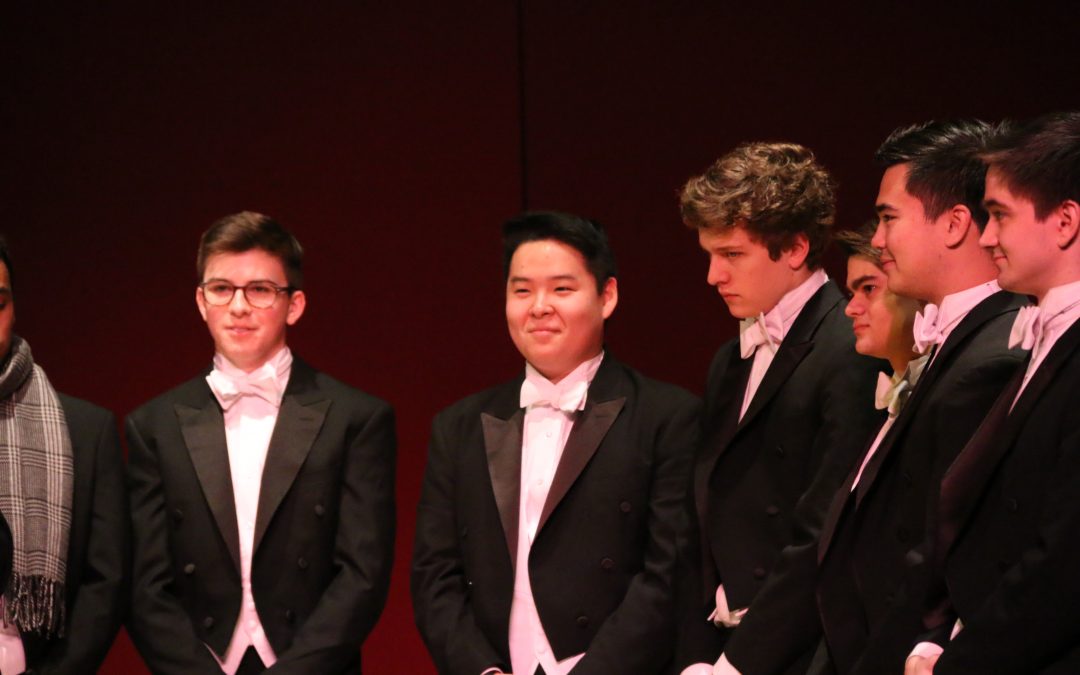
Mar 24, 2019 | School News
By Alex Kaplan ’21
On January 8, Pingry welcomed back TanTan Wang ‘16, who visited to perform with his collegiate a cappella group, the Spizzwinks. Wang is currently a member of Yale University’s Class of 2020. During his time at Pingry, he was an avid member of the school’s drama and music programs. Wang was a longtime member and president of the Buttondowns, participated in multiple Pingry productions, and received two Pingry Arts Awards in 2016 – the Outstanding A Capella Group Award and the Pingry Drama “Bottom” Award. The Spizzwinks returned to Pingry as a part of their hometown tour, which takes the group through the homes of each of its members. The East Coast leg of the hometown tour featured performances in Summit and Millburn; eventually the group opted to add Pingry as a stop to their tour. The performance included a capella renditions of popular songs, as well as spoken word skits performed by the members of the Spizzwinks.
The concert had an overwhelmingly positive response from the community. Dr. Andrew Moore shared his thoughts, saying, “The Spizzwinks were wonderful.” He commented on the technique and song choice of the group, adding that, “They draw on a long tradition of a cappella music mixing traditional and current popular songs in their repertoire,” and that, “The group has continued a high level of performance skill in both choral blend and solo singing.” Dr. Moore fondly recounted his time teaching Wang, saying that, “TanTan was a real cheerleader for the music program at Pingry. He was an outstanding Glee Club president, and was supportive of everyone in the performing arts in our community.”
Wang is one of many great examples of Pingry alumni involved in the arts. Dr. Moore expressed his appreciation for alumni like Wang, remarking, “I am so proud of all of our Pingry alumni who have gone on to sing in many of the great collegiate choral groups throughout the country.”










